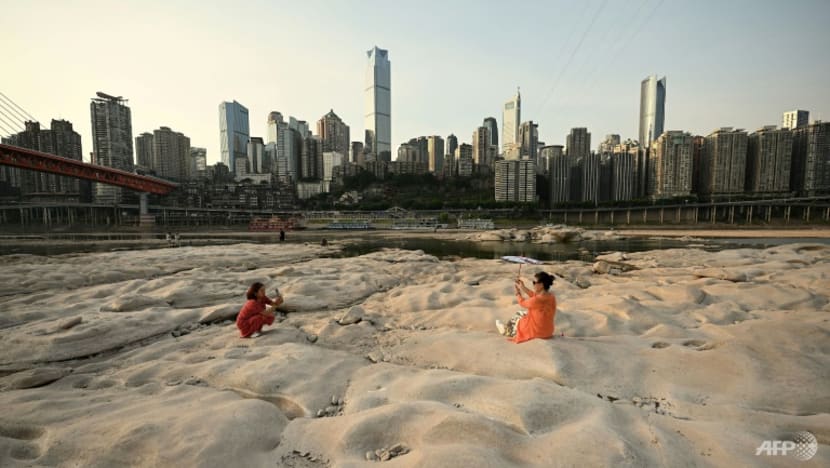
Cina’s record heatwave, worst drought in decades
In the summer of 2022, China was hit by its most severe heatwave in six decades, exacerbating a drought that has impacted food and factory production, power supplies and transport in a vast area of the country. The Yangtze River Basin, which stretches from coastal Shanghai to Sichuan province in China’s southwest and includes Asia’s longest river, was considered the worst-affected area, with hundreds of millions of people impacted. Experts say the heatwave could be among the worst recorded in global history.
Scorching temperatures
For more than 70 days straight, a brutal heatwave ravaged much of China, with sustained temperatures of more than 40 degrees Celsius (104 Fahrenheit). It affected more than 900 million people in at least 17 provinces, from southwestern Sichuan to coastal Jiangsu and Zhejiang provinces in the east.
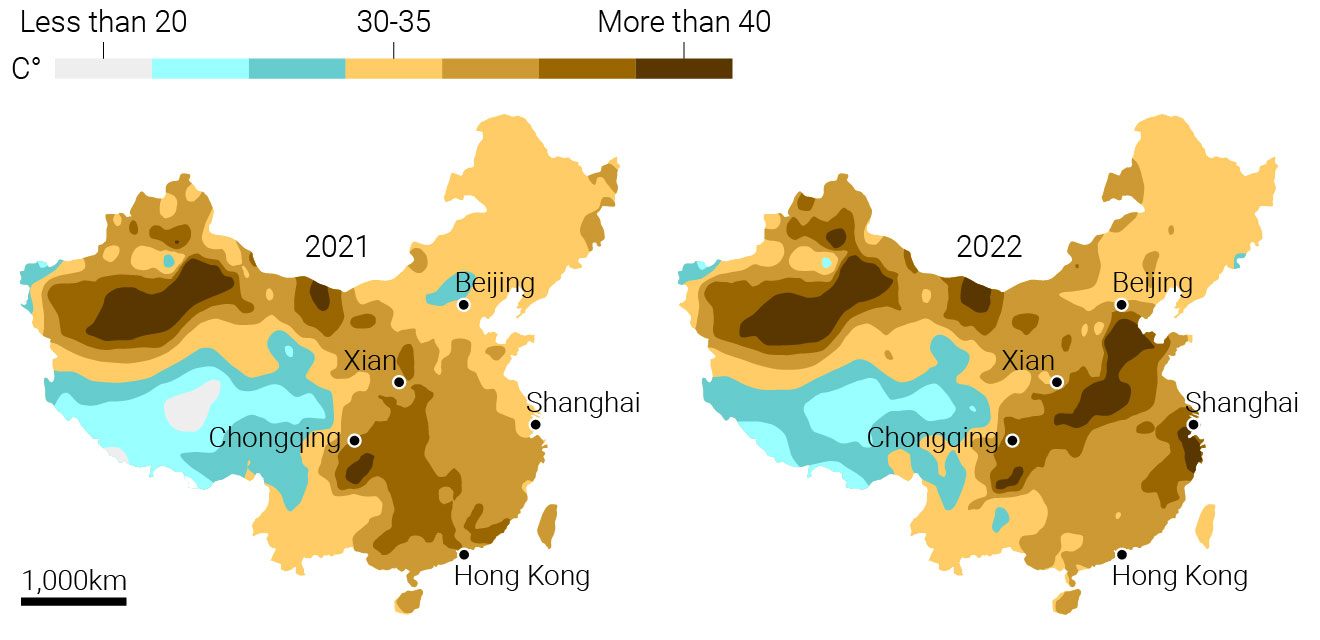 Maximum temperatures in July
Maximum temperatures in July
Severity of China’s drought
The map below shows the intensity of the drought, which has affected about half of China’s landmass, mostly in the country’s south. The drought is so severe that sections of the Yangtze River, China’s biggest river, reached their lowest level since at least 1865.
Drought level (as of August 29, 2022)
The Yangtze’s low water level has been caused by low rainfall in the river basin, reduced water flowing in from its upper reaches and hotter temperatures speeding up evaporation.
River flow (4-month forecast from August 2022)
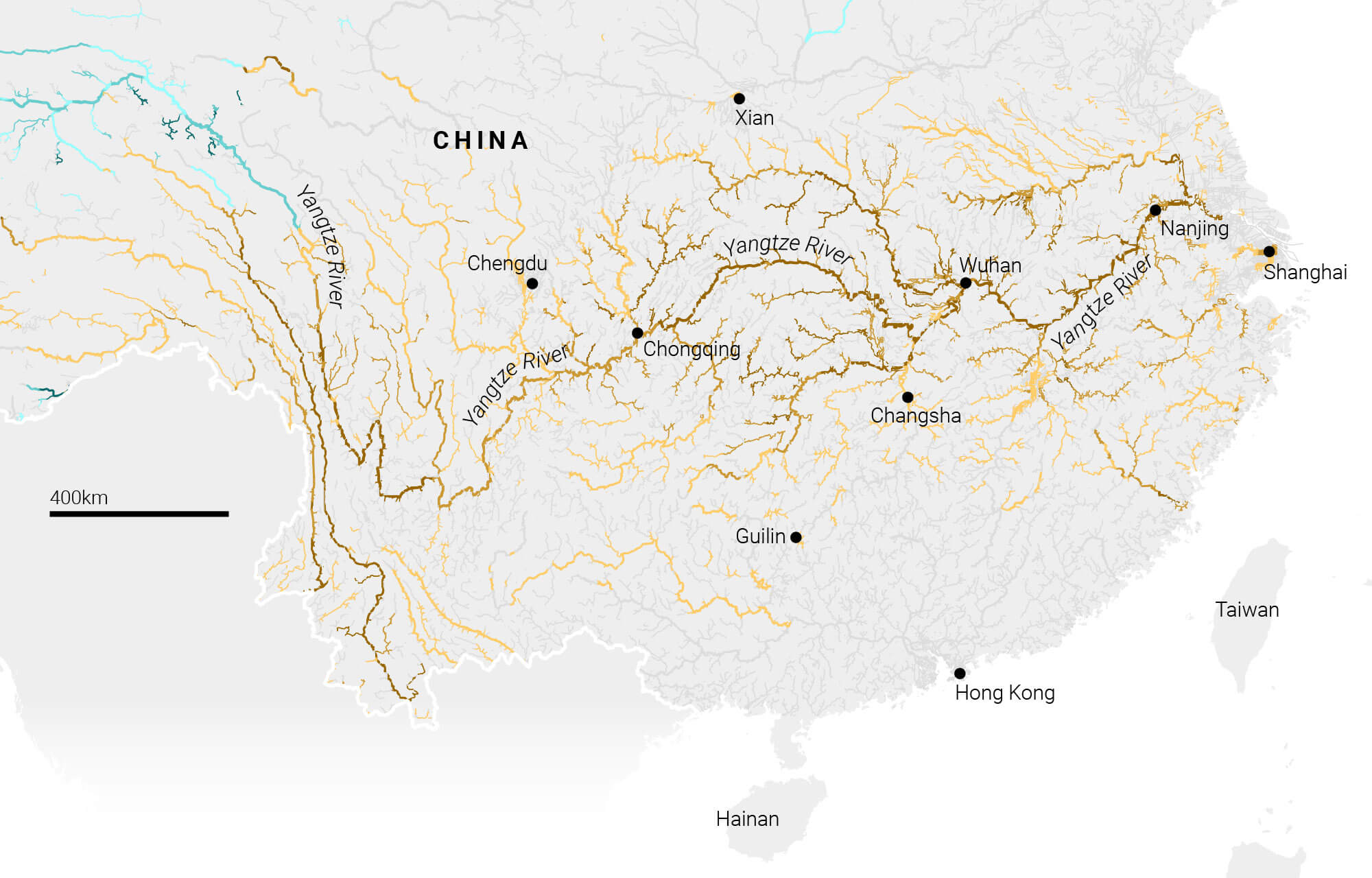 Affected areas
Affected areas
 Since July, provinces and cities in southern China, including Anhui, Jiangxi, Hubei, Hunan, Chongqing and Sichuan, were affected by drought. Low water levels in the Yangtze River increased pressure on hydroelectric power plants, affecting water supply and electricity production for millions of people and many companies, forcing the temporary closure of factories in some provinces.
Since July, provinces and cities in southern China, including Anhui, Jiangxi, Hubei, Hunan, Chongqing and Sichuan, were affected by drought. Low water levels in the Yangtze River increased pressure on hydroelectric power plants, affecting water supply and electricity production for millions of people and many companies, forcing the temporary closure of factories in some provinces.
Water levels measured at the major hydrologic stations
Drying up

 China’s two largest freshwater lakes – Poyang and Dongting, which connect to the Yangtze River – saw their lowest levels since records began in 1951. The biggest, Poyang Lake in eastern China, was at 12 metres on August 6, 2022. That meant it had entered the dry season about 100 days earlier than the average in previous years.
China’s two largest freshwater lakes – Poyang and Dongting, which connect to the Yangtze River – saw their lowest levels since records began in 1951. The biggest, Poyang Lake in eastern China, was at 12 metres on August 6, 2022. That meant it had entered the dry season about 100 days earlier than the average in previous years.
Sichuan: China's biggest hydropower producer
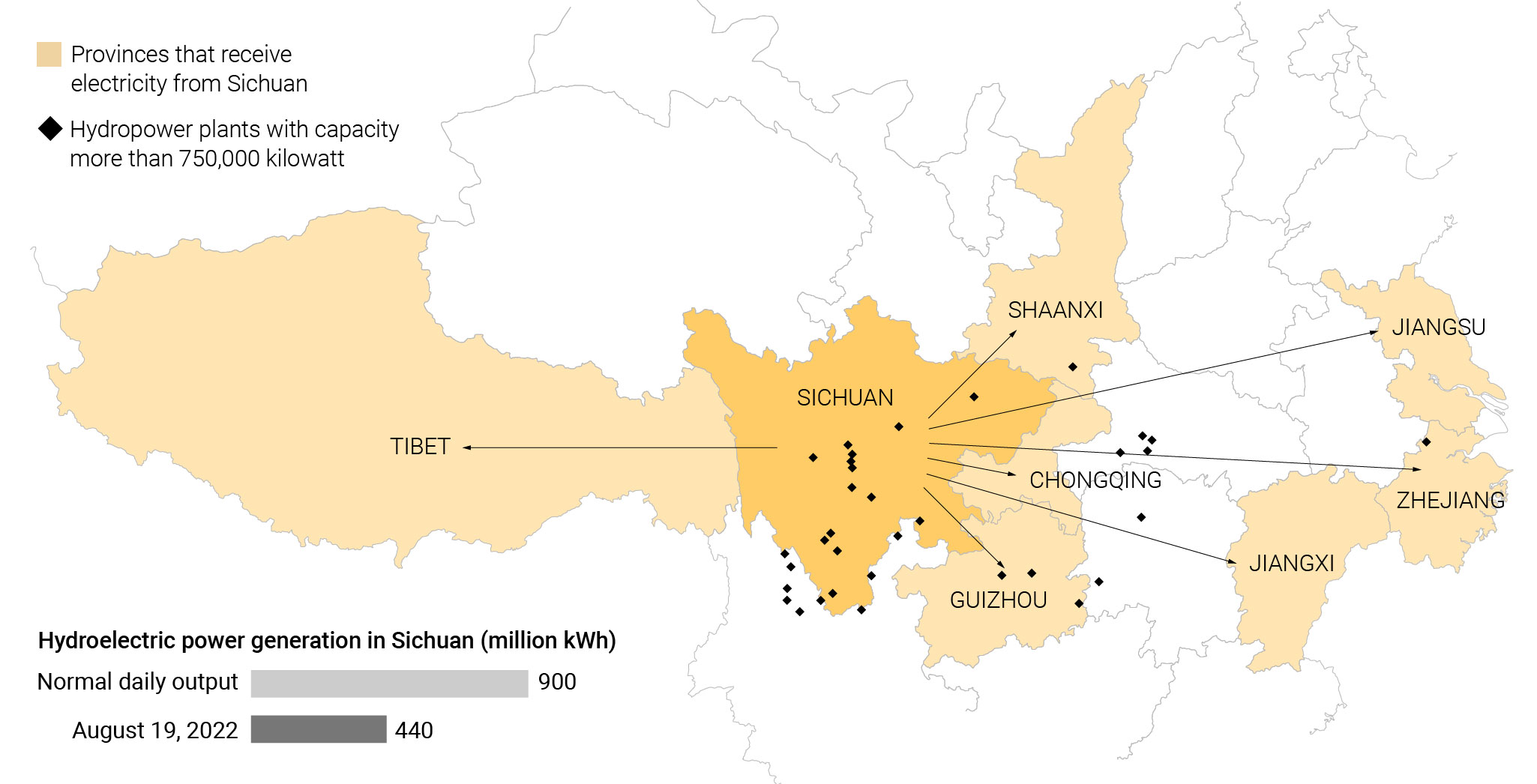 Sichuan province normally generates almost 30 per cent of China’s hydroelectric power. But the 2022 heatwave saw historically low water levels and, as a result, a massive drop in electricity production.
Sichuan province normally generates almost 30 per cent of China’s hydroelectric power. But the 2022 heatwave saw historically low water levels and, as a result, a massive drop in electricity production.
In the summer of 2022, China was hit by its most severe heatwave in six decades, exacerbating a drought that has impacted food and factory production, power supplies and transport in a vast area of the country. The Yangtze River Basin, which stretches from coastal Shanghai to Sichuan province in China’s southwest and includes Asia’s longest river, was considered the worst-affected area, with hundreds of millions of people impacted. Experts say the heatwave could be among the worst recorded in global history.
Scorching temperatures
For more than 70 days straight, a brutal heatwave ravaged much of China, with sustained temperatures of more than 40 degrees Celsius (104 Fahrenheit). It affected more than 900 million people in at least 17 provinces, from southwestern Sichuan to coastal Jiangsu and Zhejiang provinces in the east.
 Maximum temperatures in July
Maximum temperatures in JulySeverity of China’s drought
The map below shows the intensity of the drought, which has affected about half of China’s landmass, mostly in the country’s south. The drought is so severe that sections of the Yangtze River, China’s biggest river, reached their lowest level since at least 1865.
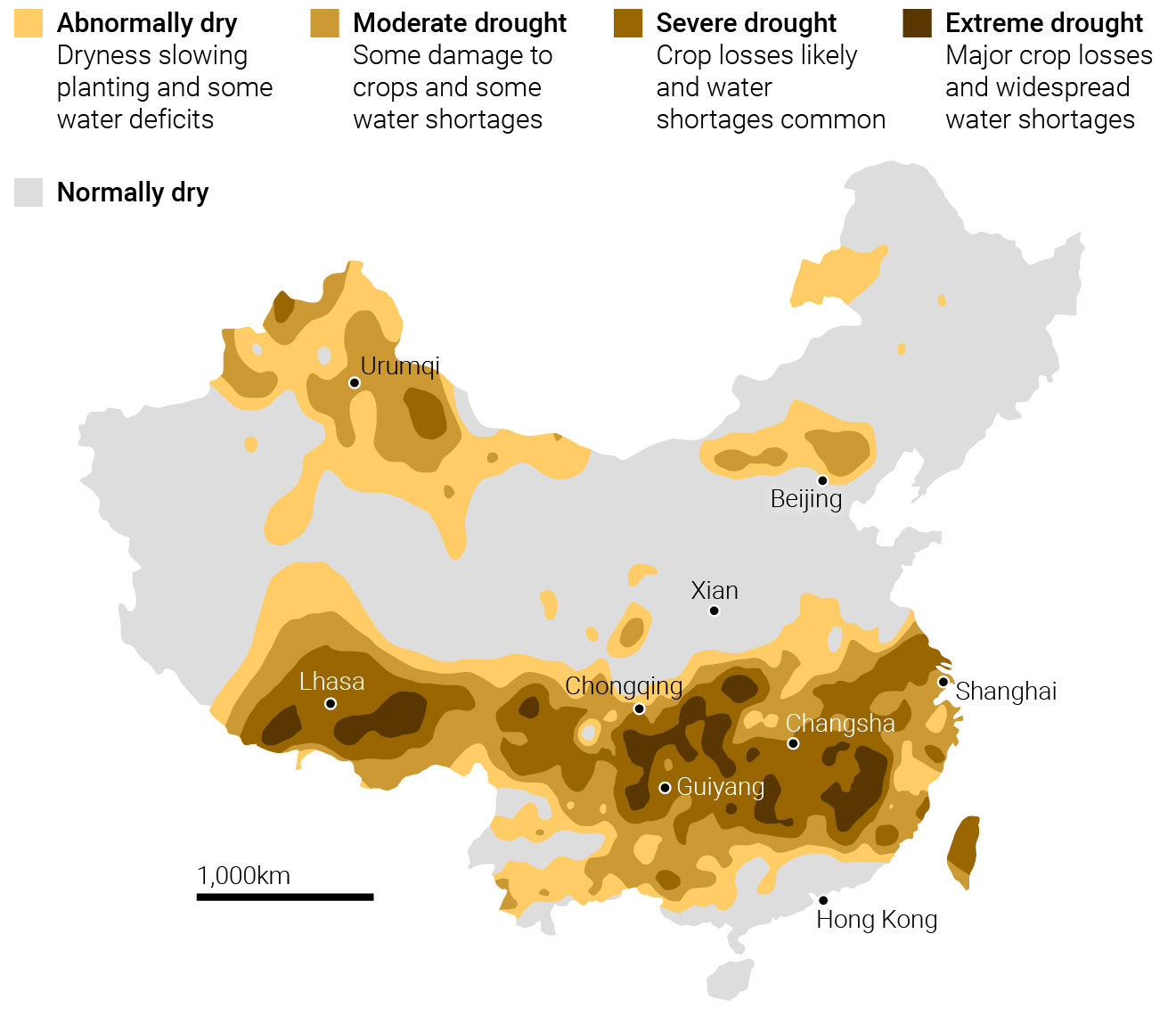 |
Drought level (as of August 29, 2022)
The Yangtze’s low water level has been caused by low rainfall in the river basin, reduced water flowing in from its upper reaches and hotter temperatures speeding up evaporation.
River flow (4-month forecast from August 2022)
 Affected areas
Affected areas Since July, provinces and cities in southern China, including Anhui, Jiangxi, Hubei, Hunan, Chongqing and Sichuan, were affected by drought. Low water levels in the Yangtze River increased pressure on hydroelectric power plants, affecting water supply and electricity production for millions of people and many companies, forcing the temporary closure of factories in some provinces.
Since July, provinces and cities in southern China, including Anhui, Jiangxi, Hubei, Hunan, Chongqing and Sichuan, were affected by drought. Low water levels in the Yangtze River increased pressure on hydroelectric power plants, affecting water supply and electricity production for millions of people and many companies, forcing the temporary closure of factories in some provinces.Water levels measured at the major hydrologic stations
Drying up

 China’s two largest freshwater lakes – Poyang and Dongting, which connect to the Yangtze River – saw their lowest levels since records began in 1951. The biggest, Poyang Lake in eastern China, was at 12 metres on August 6, 2022. That meant it had entered the dry season about 100 days earlier than the average in previous years.
China’s two largest freshwater lakes – Poyang and Dongting, which connect to the Yangtze River – saw their lowest levels since records began in 1951. The biggest, Poyang Lake in eastern China, was at 12 metres on August 6, 2022. That meant it had entered the dry season about 100 days earlier than the average in previous years.Sichuan: China's biggest hydropower producer
 Sichuan province normally generates almost 30 per cent of China’s hydroelectric power. But the 2022 heatwave saw historically low water levels and, as a result, a massive drop in electricity production.
Sichuan province normally generates almost 30 per cent of China’s hydroelectric power. But the 2022 heatwave saw historically low water levels and, as a result, a massive drop in electricity production.



No comments:
Post a Comment
Note: Only a member of this blog may post a comment.